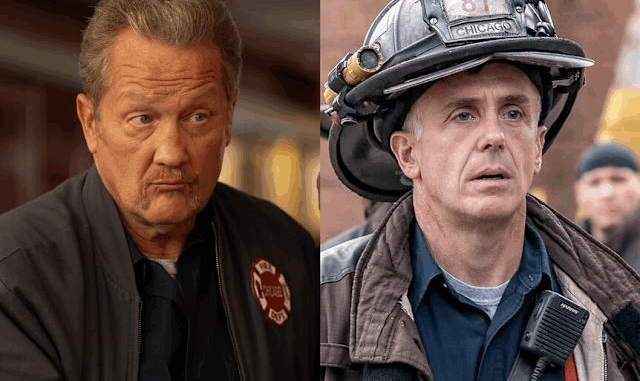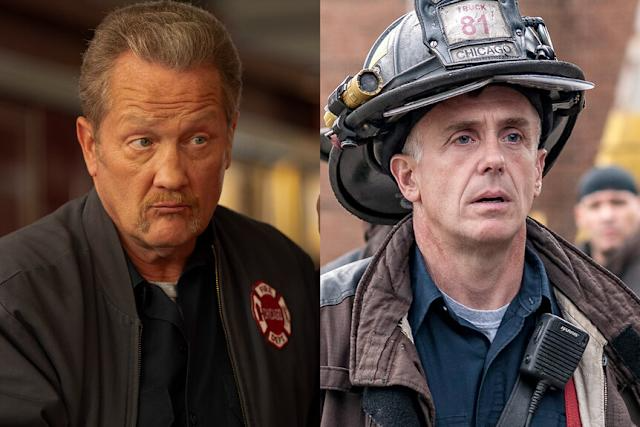
For a series built on loyalty, teamwork, and found family, Chicago Fire has developed a worrying habit — an ever-revolving door of character exits and introductions. After more than thirteen seasons, change is inevitable. But the show’s increasing tendency to reshuffle its main cast feels less like organic storytelling and more like a pattern that’s quietly undermining the very soul of Firehouse 51.
As rumors swirl about another round of casting shake-ups ahead of the new season, fans and critics alike are asking a crucial question: how much change is too much?
The Illusion of Permanence: A Family That Keeps Breaking Apart
The emotional foundation of Chicago Fire rests on the belief that Firehouse 51 is a permanent family. It’s the reason viewers connect so deeply to the series — no matter how chaotic the fires or personal dramas, the team always comes home to one another.
But when beloved characters are consistently written out, replaced, or transferred off-screen, that core message begins to crumble. The more frequently these exits happen, the less believable the bond feels.
Fans have stuck with this show through marriages, tragedies, and triumphs, but the constant departures — especially of long-serving or next-generation characters — threaten the stability that once defined it.
When Goodbyes Outnumber Homecomings
In the past few seasons alone, Chicago Fire has said farewell to several pillars of its ensemble:
-
Wallace Boden (Eamonn Walker) — The heart of 51 left in an emotional finale to become Deputy Commissioner, an honorable but painful goodbye.
-
Matt Casey (Jesse Spencer) and Sylvie Brett (Kara Killmer) — Their long-running love story ended with a wedding and a move to Portland, removing two fan favorites from the mix.
-
Blake Gallo (Alberto Rosende), Darren Ritter (Daniel Kyri), and Sam Carver (Jake Lockett) — Each represented the future of 51. Their sudden departures, however, left the firehouse looking like a revolving door rather than a lifelong commitment.
These rapid exits give the impression that Firehouse 51 is a temporary stop, not a career-defining home — a problem for a show whose very theme is unity through adversity.
The “New Recruit” Cycle: A Storytelling Shortcut
Every time a veteran leaves, Chicago Fire fills the vacancy with another newcomer — usually introduced through the same recycled formula: the “Shady New Recruit.”
This archetype, while dramatic at first, has become predictable. Whether it’s Jack Damon’s secret family ties or a rookie firefighter with a troubled past, the cycle feels repetitive and creatively safe.
The downside?
-
Wasted Potential: Screen time that could deepen fan-favorite storylines gets spent on yet another “mystery” recruit.
-
Rookie Fatigue: The audience knows the drill — new face, big reveal, dramatic fallout, exit. The emotional investment just isn’t the same.
-
Ensemble Erosion: Constant turnover prevents the kind of long-term chemistry that made the early seasons so compelling.
Instead of expanding the ensemble, the show keeps resetting it.
The Hidden Truth: Budget Over Bonds
Behind the scenes, many of these changes reportedly stem from financial and contractual pressures. Network budgets tighten over time, and veteran actors naturally command higher salaries. But when cost-cutting comes at the expense of story continuity, the trade-off is steep.
Viewers don’t tune in for explosions — they tune in for the people. For years, fans have invested emotionally in these characters’ lives, only to see them written out abruptly. It’s not just disappointing; it’s destabilizing.
Moreover, Chicago Fire’s strength lies in its ensemble. Quietly removing characters like Ritter, who represented progress and diversity within the CFD, feels like a regression rather than evolution.
The Cost of Constant Change
Ironically, the very attempt to keep things “fresh” risks alienating the core audience that has kept the show strong for more than a decade. Every season premiere becomes a guessing game: Who’s still here? Who’s next to go?
That kind of uncertainty erodes trust. And once fans stop believing in the permanence of Firehouse 51, they stop believing in its stories.
Rekindling the Flame: How Chicago Fire Can Fix It
To regain its footing, the show doesn’t need another wave of recruits — it needs stability, depth, and faith in the people already carrying the torch.
-
Elevate the Veterans: Give more emotional weight to long-serving characters like Mouch (Christian Stolte), Joe Cruz (Joe Minoso), and Stella Kidd (Miranda Rae Mayo). Their arcs can evolve without forcing exits.
-
Use Boden Wisely: Now that Eamonn Walker is returning as Deputy Commissioner, let him serve as the emotional bridge — guiding leadership transitions instead of sparking more departures.
-
End the Recruit Formula: Introduce new firefighters who bring optimism and skill, not secrecy and scandal. Real firehouses are built on trust, not endless mysteries.
-
Focus on Continuity: Celebrate the history and legacy of 51. Viewers have grown with this crew; honor that connection instead of erasing it.
Firehouse 51 Deserves Stability
Chicago Fire remains one of NBC’s most enduring dramas because it once made fans feel like part of the family. But every time another beloved firefighter leaves, a little of that trust burns away.
The show doesn’t need to reinvent the wheel — it just needs to remember why it worked in the first place. Firehouse 51 isn’t just a job; it’s a promise. One that deserves to be kept.
